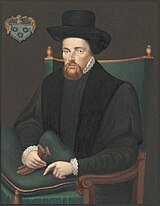
The 3rd Parliament of King James I was summoned by King James I of England on 13 November 1620 and first assembled on 30 January 1621. The elected speaker was Sir Thomas Richardson, the Member of Parliament for St Albans.

The 3rd Parliament of King James I was summoned by King James I of England on 13 November 1620 and first assembled on 30 January 1621. The elected speaker was Sir Thomas Richardson, the Member of Parliament for St Albans.
After the disappointment of the 1614 Addled Parliament King James had attempted to rule without Parliament, but was obliged by events in continental Europe to summon a third parliament. His son-in-law Frederick V, Elector Palatine had accepted the throne of Bohemia and triggered an invasion by Spanish forces and James needed additional funds if he were to intervene on his son-in-law's behalf. To his relief Parliament voted him the additional subsidies and then moved on to investigate the abuse of monopolies and reform the Court of Chancery.
During their investigations the Commons discovered that the Lord Chancellor, Sir Francis Bacon, the Viscount St Albans, had been taking bribes, resulting in him being dismissed from his office, fined and imprisoned. Other investigations into monopoly abuse revealed that a royal favourite George Villiers, 1st Duke of Buckingham and his associates were deeply involved, including Sir Giles Mompesson, who was stripped of his parliamentary seat and knighthood, and Buckingham's half-brother Sir Edward Villiers. King James reacted by threatening to dissolve the parliament in June 1621 but relented and allowed it to continue after the summer recess.
When Parliament reassembled James demanded further subsidies and Parliament reluctantly acceded to his demand on condition that they should be allowed to finish their other business and also suggested that his son Prince Charles should seek a Protestant wife rather than the Spanish match James had in mind. James furiously asserted that royal marriages were nothing to do with Parliament, who in return drew up a protestation affirming their right to free speech, as a result of which James adjourned the sitting and ordered the arrest of the Protestation's principal author Sir Edward Coke. Further arrests followed and James downgraded the parliament to a convention (i.e. a parliament without royal approval) and finally dissolved it by proclamation on 6 January 1622.

George Villiers, 1st Duke of Buckingham, KG, was an English courtier, statesman, and patron of the arts. He was a favourite and self-described "lover" of King James VI and I. Buckingham remained at the height of royal favour for the first three years of the reign of James's son, King Charles I, until he was assassinated.
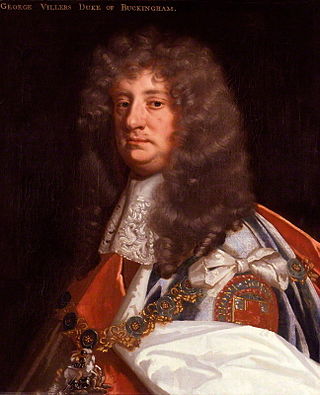
George Villiers, 2nd Duke of Buckingham, 19th Baron de Ros, was an English statesman and poet who exerted considerable political power during the reign of Charles II of England.
Duke of Buckingham, referring to Buckingham, is an extinct title that has been created several times in the peerages of England, Great Britain, and the United Kingdom. There were creations of double dukedoms of Buckingham and Normanby and of Buckingham and Chandos. The last holder of the dukedom died in 1889.

Anthony Ashley Cooper, 1st Earl of Shaftesbury PC, FRS, was an English statesman and peer. He held senior political office under both the Commonwealth of England and Charles II, serving as Chancellor of the Exchequer from 1661 to 1672 and Lord Chancellor from 1672 to 1673. During the Exclusion Crisis, Shaftesbury headed the movement to bar the Catholic heir, James II, from the royal succession, which is often seen as the origin of the Whig party. He was also a patron of the political philosopher John Locke, with whom Shaftesbury collaborated with in writing the Fundamental Constitutions of Carolina in 1669.
The Personal Rule was the period in England from 1629 to 1640 when King Charles I ruled as an autocratic absolute monarch without recourse to Parliament. Charles claimed that he was entitled to do this under the royal prerogative and that he had a divine right.

Lionel Cranfield, 1st Earl of Middlesex was an English merchant and politician. He sat in the House of Commons between 1614 and 1622 when he was raised to the peerage as Baron Cranfield.
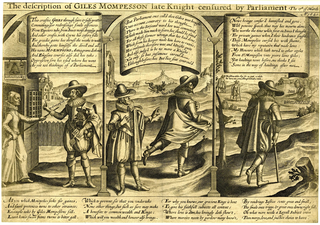
Giles Mompesson was an English office holder and courtier who sat in the House of Commons between 1614 and 1621, when he was sentenced for corruption. He was officially a "notorious criminal" whose career was based on speculation and corruption. His name came to be regarded as a synonym for official corruption, because he used nepotism to gain positions for licensing businesses by which he pocketed the fees. In the reaction against Charles I, Mompesson's name was invoked as a symbol of all that was wrong with aristocracy. Sir Giles Overreach, the anti-hero of Philip Massinger's 1625 play A New Way to Pay Old Debts, is based on Mompesson.
Francis Mitchell was the last English knight of the realm to be publicly degraded, after being found guilty of extorting money from licensees following his being granted monopoly on the licensing of inns by George Villiers, 1st Duke of Buckingham and James I.

Sir Thomas Richardson of Honingham in Norfolk, was an English judge and politician who sat in the House of Commons from 1621 to 1622. He was Speaker of the House of Commons for this parliament. He was later Chief Justice of the Common Pleas and Chief Justice of the King's Bench.

James I, the first king to reign in both England and Scotland, faced many difficulties with the Parliament of England. Though recent studies have shown that the Parliament of Scotland may have been more of a thorn in his side than was previously believed, James developed his political philosophy of the relationship between monarch and parliament in Scotland and reconciled himself to the independent stance of the English Parliament and its unwillingness to bow readily to his policies.
Events from the 1620s in England. This decade sees a change of monarch.
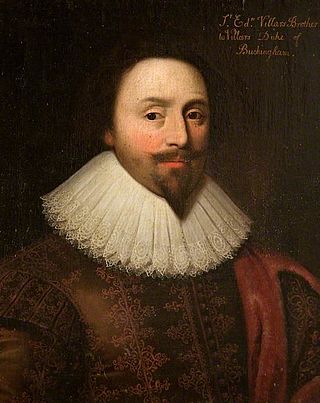
Sir Edward Villiers was an English nobleman from Leicestershire and member of the Villiers family, whose younger half-brother George Villiers, 1st Duke of Buckingham, was a favourite of both James VI and I and his son Charles. Through his influence, Sir Edward gained various positions, including Master of the Mint, Member of Parliament for Westminster and Lord President of Munster. He died in Ireland in September 1626.
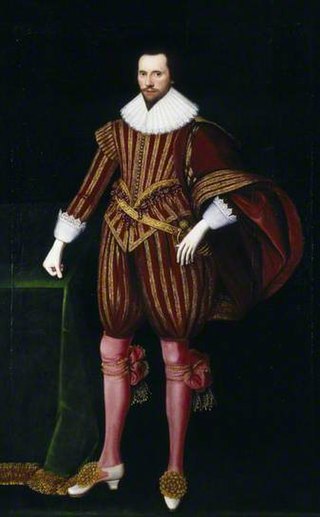
Francis Seymour, 1st Baron Seymour of Trowbridge, of Marlborough Castle and Savernake Park in Wiltshire, was an English politician who sat in the House of Commons at various times between 1621 and 1641 when he was raised to the peerage as Baron Seymour of Trowbridge. He supported the Royalist cause during the English Civil War.
Sir Henry Yelverton was an English lawyer, politician, and judge.

Sir Oliver St John, 1st Viscount Grandison was an English soldier and politician who became Lord Deputy of Ireland.
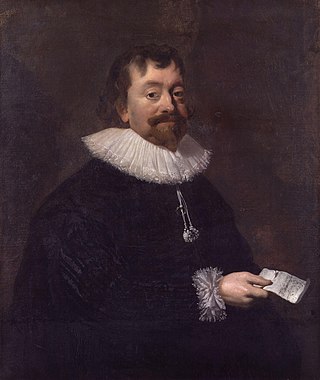
Sir Robert Phelips was an English politician who sat in the House of Commons at various times between 1604 and 1629. In his later Parliaments he was one of the leading spirits in the House of Commons and an opponent of James I, Charles I and their adviser Buckingham.
Christopher Villiers, 1st Earl of Anglesey, known at court as Kit Villiers, was an English courtier, Gentleman of the Bedchamber and later Master of the Robes to King James I. In 1623 he was ennobled as Earl of Anglesey and Baron Villiers of Daventry.
Villiers is an aristocratic family in the United Kingdom. Over time, various members of the Villiers family were made knights, baronets, and peers. Peerages held by the Villiers family include the dukedoms of Buckingham (1623–1687) and Cleveland (1670–1709), as well as the earldoms of Anglesey (1623–1661), Jersey, and Clarendon. Perhaps the most prominent members of the family were those who received the two dukedoms: George Villiers, 1st Duke of Buckingham (1592–1628) rose to fame and influence as favourite of King James I of England, while Barbara Villiers, Duchess of Cleveland (1640–1709) became a mistress of King Charles II of England, by whom she had five children.

The 1st Parliament of King James I was summoned by King James I on 31 January 1604 and assembled on 19 March following. It was known as the Blessed Parliament and took place in five sessions, interrupted by Holy Days and the Gunpowder Plot. The speaker was Edward Phelips, the Member of Parliament for Somerset.

The 3rd Parliament of King Charles I was summoned by King Charles I of England on 31 January 1628 and first assembled on 17 March 1628. The elected Speaker of the House of Commons was Sir John Finch, the Member of Parliament for Canterbury.